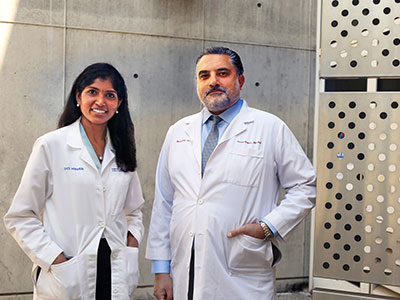Seeking a solution for advanced gastric cancer
UCI Health oncologists’ successful STOPGAP study becomes a multisite national trial

UCI Health gastrointestinal cancer experts Dr. Maheswari Senthil (left) and Dr. Farshid Dayyani are spearheading a national clinical trial of a novel treatment for advanced gastric cancer, a deadly disease that disproportionately affects Hispanics and younger adults. Photo by Karen Tapia
Surgical oncologist Dr. Maheswari Senthil and medical oncologist Dr. Farshid Dayyani are a dynamic duo working together to improve treatment for advanced stomach cancer, called gastric carcinomatosis, a deadly disease that is increasingly being diagnosed in Hispanics and younger adults.
The UCI Health gastrointestinal cancer specialists recently completed an innovative phase 1/2 clinical trial seeking to improve the effectiveness of treatment once the disease has spread into the abdominal cavity. It was designed by the researchers to study the effect of adding direct abdominal chemotherapy in patients with advanced stomach cancer.
The success of that novel trial, called STOPGAP I, paved the way for STOPGAP II, a randomized national phase 2/3 clinical trial now open for patient accrual at the UCI Health Chao Family Comprehensive Cancer Center. The new trial, which will also be offered by many leading U.S. cancer centers, is supported by federal research funding from the National Cancer Institute, a division of the National Institutes of Health.
“Stomach cancer is the fourth-leading cause of cancer deaths worldwide,” says Senthil, who specializes in advanced gastrointestinal cancers. “One of the most feared and common forms spreads to the lining of the abdominal cavity, and once it reaches the advanced stages, patients often have a survival rate of little more than six months.This is especially concerning in our community, where we serve a large Hispanic population that is experiencing rising incidence rates.”
Novel approach
To address the poor survival rate, Senthil and Dayyani investigated the feasibility of administering chemotherapy directly into the abdominal cavity — a procedure known as normothermic intraperitoneal chemotherapy. After standard intravenous chemotherapy, this technique delivers higher doses of the drug paclitaxel directly into the peritoneum, the lining of the abdominal cavity.
That is followed by surgery to remove all visible cancerous tissue and an abdominal bath of heated chemotherapy to eradicate any remaining microscopic cancer cells.
Results of the initial study demonstrated the safety and feasibility of this approach, leading to the approval of STOPGAP II, which will compare survival outcomes of patients who receive a combination of intraperitoneal chemotherapy and systemic therapy with participants who receive systemic chemotherapy alone.
Trial participants would then undergo surgery to remove cancerous tissue followed by hyperthermic intraperitoneal chemotherapy. This comprehensive approach is designed to boost survival rates and optimize the quality of life for patients battling advanced gastric cancer.
An important advance
The STOPGAP trials represent an important step in addressing the critical treatment gap for patients with advanced stomach cancer. The trials have the potential to change the current standard of care.
The urgency of this research — and the need for greater philanthropic funding in this arena — is underscored by alarming trends. In Southern California, recent statistics reveal that the rate of gastric cancer diagnosed among Hispanics — 12 people per 100,000 — is nearly double that of other ethnic groups.
“The factors contributing to this disparity are complex and include diet, lifestyle and genetic predisposition,” Senthil says. “We’ve observed that many patients present with advanced-stage cancer, which often results in poor outcomes.”
Since STOPGAP I was launched in 2021, the response has been overwhelmingly positive, with participants outside the region seeking out this innovative treatment. With STOPGAP II now opening in leading cancer centers across the country, Senthil and her collaborators will be able to systematically study the benefits of this approach.
As the trial progresses, Dayyani and Senthil emphasize the continued need for philanthropic efforts to fuel this research. “We still have many research questions to answer,” she says. “Identifying which patients respond best to our treatments is crucial. The path forward requires sustained support from the community.”
Anti-Cancer Challenge boost
Both doctors credit funding from the UC Irvine Anti-Cancer Challenge, which provided seed money for their initial pilot project and early-phase clinical trial.
“Without it, we wouldn’t have been able to launch STOPGAP or secure further national support,” Senthil says, adding that continued philanthropic assistance will help cancer researchers tackle broader challenges.
View a video of the doctors describing the STOPGAP trial and the power of philanthropy ›
Since its inception in 2017, the Anti-Cancer Challenge has raised $6.2 million, all of which has underwritten 123 promising pilot studies and early-phase clinical trials at the Chao Family Comprehensive Cancer Center. This support catalyzed an additional $44.5 million in extramural funding, significantly boosting the research efforts of the only National Cancer Institute-designated comprehensive cancer center based in Orange County.
The ninth Anti-Cancer Challenge will take place on Saturday, Oct. 11, on the university campus.
Learn more about the annual event to ride, run, walk and volunteer to raise research funds for cancer at anti-canccerchallenge.org.




